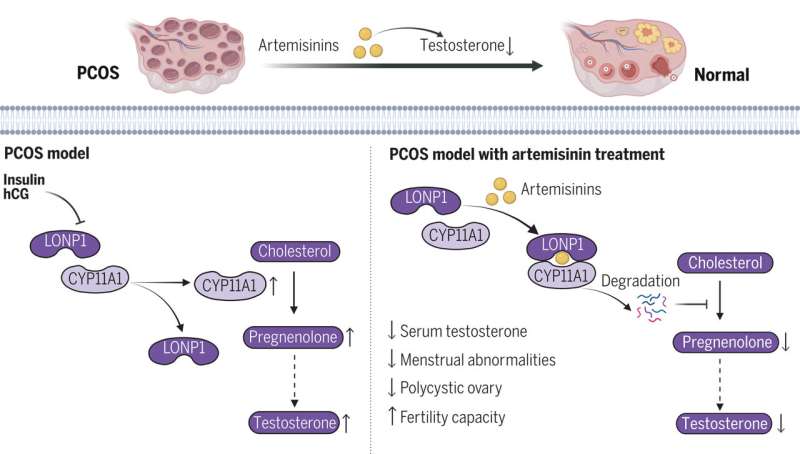June 14, 2024 report
This article has been reviewed according to Science X's editorial process and policies. Editors have highlighted the following attributes while ensuring the content's credibility:
fact-checked
peer-reviewed publication
trusted source
proofread
Antimalarial drug shows promise in treating polycystic ovarian syndrome

A team of metabolic specialists and molecular biologists at Fudan University's Zhongshan Hospital, working with colleagues from other institutions in China, has found that some antimalarial drugs show promise in treating polycystic ovarian syndrome (PCOS) in women.
In their study, published in the journal Science, they tested the drug dihydroartemisinin (a type of artemisinin) in mice and then in a small group of women with PCOS. Elisabet Stener-Victorin, with the Karolinska Institutet, has published a Perspective piece in the same journal issue outlining the work and suggests that it could change how PCOS is treated in the future.
PCOS is a condition in which women experience abnormal cyst growth on their ovaries, leading to symptoms such as abdominal pain, an irregular menstrual cycle, excessive hair growth, acne and often obesity. The symptoms of the condition have generally been attributed to production of abnormally high levels of androgens.
It is not known what causes PCOS and it is not curable, but several therapies have been developed to alleviate symptoms. In this new effort, the team in China found that administration of a class of drugs typically used to treat malaria reduced symptoms in both mouse models and women.
Several years ago, another team of researchers discovered that giving obese people the drug artemisinin helped turn their white adipose fat into beige adipose fat, which is easier to burn off with exercise. That led the team on this new effort to consider whether such drugs might be beneficial to PCOS patients because other research had shown a connection between levels of brown adipose fat and PCOS.
The researchers first gave the test mice dehydroepiandrosterone, a type of androgen, to mimic PCOS. They then gave them artemisinin and found that it prevented elevated levels of testosterone and the development of cysts.
Emboldened by their results, the team conducted a small clinical trial involving 19 PCOS patients—each was given artemisinin three times a day for three months. At that point, 12 of the patients found their menstrual cycles more regular, and almost all the patients had lower levels of testosterone in their blood. Additionally, cyst development was reduced.
More information: Yang Liu et al, Artemisinins ameliorate polycystic ovarian syndrome by mediating LONP1-CYP11A1 interaction, Science (2024). DOI: 10.1126/science.adk5382
Elisabet Stener-Victorin, Remedy hope for polycystic ovary syndrome, Science (2024). DOI: 10.1126/science.adq0328
© 2024 Science X Network





















